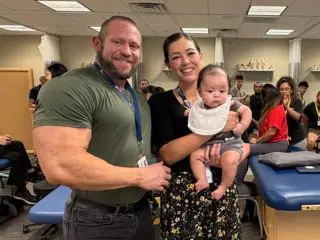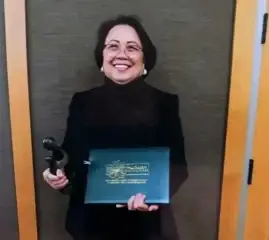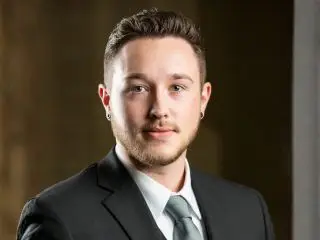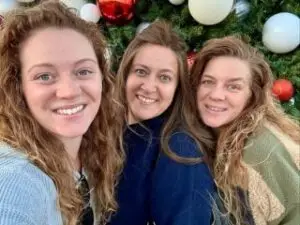There are times when a random act of kindness can evolve into something much greater.
When the Eagle Creek Fire darkened the skies over Portland, Oregon in 2017, it burned 50,000 acres over three months. The air was thick and unhealthy, and many people in the region struggled to breathe.
One morning, as she passed the neighboring Portland Bridge Club on her way to class at Carrington College Portland, Medical Assisting Instructor Tracey Sanchez had an idea.
“Most of the bridge players are seniors, and I knew the air quality had to be taking a huge toll on them because it was impacting me,” says Sanchez, who has taught at Carrington since 2016. “I told our campus director I thought it would be a great idea to offer some of our program’s face masks to the bridge players. She agreed, so several students and I took dropped by with a box of masks after one of their games.”
What happened next set the stage for an ongoing relationship that continues to this day.
“As we were talking with the seniors, I mentioned that if any of them wanted their blood pressure taken, we could offer that service to them free of charge,” Sanchez recalls. “Not only would it provide them with valuable health information, it would give our Medical Assisting students a chance to experience what it’s like to interact with ‘real people’ rather than practicing on each other in the classroom.”
Twice a month, Sanchez and a group of six to eight students visit the Bridge Club and perform blood pressure checks on anyone who has signed up.
“We average 20 blood pressure checks every visit,” says Sanchez. “We also have an open-door policy for the seniors, so they can drop by the school whenever they want. Since we started, we’ve performed thousands of blood pressure checks.”
The information they provide the seniors can prove instrumental in helping them monitor their own health.
“Just the process of having your blood pressure taken regularly can help people become more conscious and aware of their overall health,” Sanchez says. “And while Medical Assistants aren’t able to diagnose, we can—and do—recommend follow-up visits with a person’s health care provider if we notice inconsistencies in his or her blood pressure over multiple visits.”
Student Logan Mercer, who worked as an Army combat medic in Afghanistan and Iraq before enrolling in the Medical Assisting program, says interacting with the seniors offers students a unique opportunity.
“When you have students in a classroom taking each other’s pulse or blood pressure, you learn the mechanics of administering health care, but you don’t really learn how to interact with patients one-on-one,” says Mercer, who graduates from the Medical Assisting program in June.
“The seniors have a lot of life experience and wisdom to share,” he says. “For us, it’s a great way to learn how to communicate with different personalities. Talking with people who are generations older also helps us develop more effective communication skills. But beyond that, it’s a chance to create a human connection. It’s one of those arrangements where everybody benefits.”
Barry Chapelle couldn’t agree more. Chapelle, 78, plays bridge at the club every Monday, Wednesday and Friday and has been the program’s most consistent “patient” since the informal program began.
“I’m taking several medications, so I need keep an eye on my blood pressure,” says Chapelle, a retired high school math teacher. “I drop by the school twice a week to have it checked and to visit Tracey, Logan and the other students.”
Chapelle, who works part-time as a bus driver for a nearby retirement community, says that while he’s grateful for the medical information he receives during each visit, there’s something else he values just as much.
“I love the friendship I’ve developed over time with Tracey and her students,” says Chapelle. “I look forward to seeing them because they’re always so welcoming and fun to talk with. Visiting them just makes me feel good. Even though I’m usually there for only 10 to 15 minutes, I’m always glad I went.”
Chapelle, who drops by the school after his bridge sessions, says he knows the blood pressure checks are accurate for one simple reason.
“When they take my blood pressure, they know whether I’ve had a good game,” jokes Chapelle. “When I’ve done well, it’s normal. If I haven’t done well, it’s not!”



